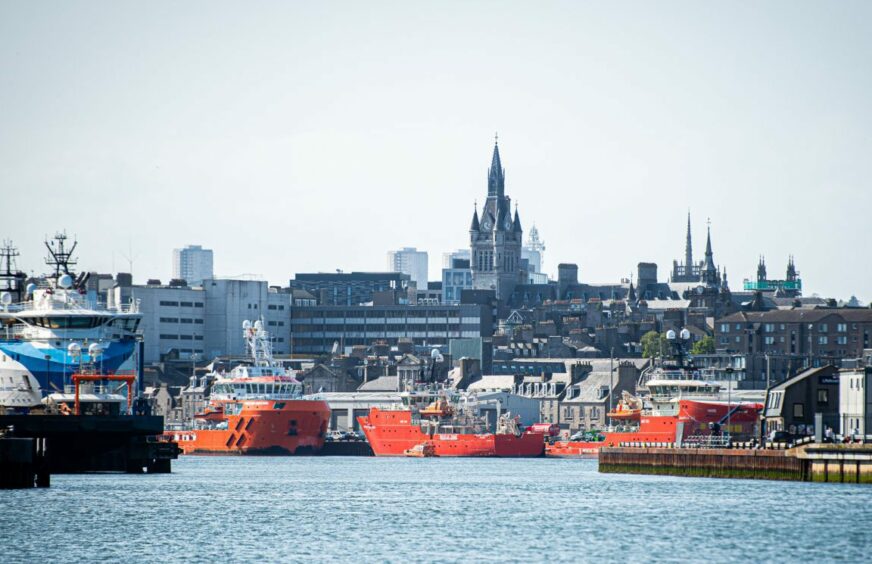
Business leaders have accused the UK Government of “watering down” its commitment to base hundreds of energy civil servants in Aberdeen, as Energy Voice can reveal just 35 additional roles will be moved to the city by 2027.
The number is far fewer than the 200 Department for Energy Security and Net Zero (DESNZ) roles that initial media reports suggested could be moved to Aberdeen.
The reports followed a UK Government announcement in December last year outlining plans to establish a second DESNZ headquarters in Aberdeen.
The new DESNZ base came as part of wider government plans to relocate 22,000 civil service roles away from London.
The prospect of hundreds of civil servants moving to Aberdeen was heralded as “fantastic news for the region” and a potential boost to struggling city centre retail.
Now, Aberdeen business leaders have told Energy Voice that “any watering down of the 200 jobs that were promised by the UK government would be extremely disappointing”.
DESNZ in Aberdeen
Announcing the plans, the UK government said the move to establish a DESNZ base in Aberdeen aimed to “further strengthen the Union” and place key decision making roles in every corner of the UK.
Scottish Secretary Alister Jack said the move demonstrated the UK government’s commitment to the North East of Scotland and the oil and gas and renewable energy sectors.
“They both have a vital role in ensuring our energy security and assisting with our transition to net zero,” Mr Jack said.
Meanwhile, energy minister and West Aberdeenshire and Kincardine MP Andrew Bowie said the selection of Aberdeen for the second headquarters underlines the importance of the region in the UK’s net zero transition.
“An Aberdeen base puts those working in the department closer to those working in the crucial oil gas and renewables industries – both the companies and the tens of thousands of their workers who play a vital role in our energy supply – and I am delighted to see this happen,” he said.
But the lack of clarity from the UK Government on the exact number of jobs moving to Aberdeen appeared to cause confusion among senior Conservative figures.
Mr Bowie heralded the move on social media, retweeting a Press and Journal headline which declared “hundreds of civil servant roles” were headed for the North East.
We have another HQ! 🥳@energygovuk's second Headquarters in Aberdeen will put the UK Government on the doorstep of key players in the energy sector, in a region vital for our energy security and transition to net zero. 🇬🇧 pic.twitter.com/YpLHxqSMqJ
— Andrew Bowie (@AndrewBowie_MP) December 11, 2023
Meanwhile, Minister for the Cabinet Office John Glen MP told the BBC that “hundreds more” energy departments civil servants would come to work and live in Aberdeen.
Lack of clarity on DESNZ numbers
However, a spokesperson for DESNZ confirmed to Energy Voice that an additional 35 roles were expected to be based in Aberdeen by 2027, up from the approximately 100 departmental staff already based in the Granite City.
The existing 100 DESNZ staff in Aberdeen includes roles within the environmental operator OPRED.
The city is also home to the North Sea Transition Authority (NSTA) and the Net Zero Technology Centre (NZTC), with the latter backed by UK Government and Scottish Government funding.
While the initial UK government announcement did not specify the number of additional DESNZ roles set to be based in Aberdeen, the Financial Times reported a figure of 200 according to “people familiar with the plan”.
The news of “hundreds” of roles moving to Aberdeen was widely reported in the media, including in Energy Voice, and the UK government and DESNZ officials did not issue a correction.
Energy Voice understands the initial announcement was drafted by the Cabinet Office, rather than DESNZ officials, which had created “confusion” over the exact number of roles set to be relocated.
The Cabinet Office declined to comment for this story, referring questions to DESNZ.
The Prime Minister’s office also declined to comment.
While further energy civil servant roles could be relocated to Aberdeen in the future, neither DESNZ nor the Cabinet Office identified any definitive plans beyond 2027.
Last year’s announcement had been widely welcomed by Aberdeen business leaders, with Aberdeen Grampian Chamber of Commerce (AGCC) calling it “fantastic news for the region”.
The prospect of hundreds of civil servants being based close to Union Street had led to optimism from the Chamber that it could provide a boost to struggling city centre retail.
Watered down commitment ‘extremely disappointing’
Reinvigorating Union Street has also been a key focus for the AGCC, which has campaigned for any additional energy civil servants to be based in the city centre.
In response to the AGCC campaign, UK Energy Minister Graham Stuart had committed to ensuring the Government Property Agency factored the ‘Our Union Street‘ initiative into its planning for the second DESNZ headquarters.
But in response to DESNZ confirming just 35 roles are set to be moved to the Granite City, AGCC policy adviser Fergus Mutch said any watering down of the 200 jobs commitment would be “extremely disappointing”.
“If the UK government is serious about pursuing a levelling-up agenda that works for all regions of the UK, then they should look seriously at relocating civil service jobs from Whitehall,” Mr Mutch said.
“In the case of functions relating to energy security and net zero then it makes an abundance of sense for these to be located in the North East of Scotland — the region that will lead the UK’s energy transition and is home to the country’s world class energy sector and supply chain.
“Any watering down of the 200 jobs that were promised by the UK government would be extremely disappointing and we are keen to engage on the detail of their plans to ensure that their original commitment is honoured.”
Mr Mutch said the Chamber had offered to support efforts to find a suitable office premises for DESNZ in Aberdeen.
Meanwhile, North East energy industry expert Dick Winchester said the relocation of just 35 roles to the new DESNZ base reinforced his view that the initial announcement was “tokenism, and therefore entirely political”.
Mr Winchester said he wouldn’t put much hope in the move happening at all, given the forthcoming general election and the lack of certainty over whether any potential incoming Labour would follow through with the plans.
SNP MP for Gordon, Richard Thomson, called for Andrew Bowie to come before the House of Commons to explain the situation.
He said: “The news that only 35 jobs will be created in Aberdeen, despite the UK government promising ‘hundreds’, is deeply disappointing.
“The North East finds itself at the forefront of the green energy renewable goldrush, but that potential can only be reached if the investment and jobs come with it.
“Andrew Bowie must come before the House at the earliest opportunity and correct this error, and explain why Aberdeen is once again being overlooked. The future of the North East is far too important.
“However, this is what we have come to expect from Westminster – who are happy to squander Scotland’s vast natural resources in order to prop up the books of the UK Treasury.
“There can be no doubt that Scotland’s energy should be in Scotland’s hands. We have the energy, we just need the power.”
‘Harder to build a career’
Institute for Government civil service researcher Jordan Urban told Energy Voice that having a smaller number of DESNZ civil servants in Aberdeen will make it harder for officials to build a career in the city.
“Ambitious officials need to be able to move between jobs – ideally, actually, between multiple departments – to advance up the civil service,” Mr Urban said.
“Part of the question is the type of office that the government wants to build in Aberdeen.
“If it wants it to include senior and policy roles, having so few officials based in the city is not sensible.”
However, Mr Urban said if the government is targeting more operational and mid-level roles, “their revised approach is more sensible and will still provide some local people with a good career”.
“But this latter option is not really a ‘second HQ’, more of an additional office, and will have less impact on the workings of the civil service as a whole,” he said.
Mr Urban said Aberdeen’s biggest strength is its number of energy-relevant external stakeholders. But its biggest weakness is the small number of civil service roles in the city.
“If the civil service wants to make Aberdeen work, it should make sure there are a substantial number of civil service roles that officials can move between to advance their career, and enough senior staff to give the office its own centre of gravity,” he said.
Mr Urban said the best way to do this is to establish a ‘Net Zero Campus’ in the city, incorporating civil servants from multiple departments.
What about GB Energy?
While business leaders may be disappointed that fewer DESNZ civil servants are headed to the North East, the Granite City may still be in line for a jobs boost if Labour wins the next general election.
Labour has outlined plans to establish GB Energy, a publicly-owned energy firm which will aim to make the UK a “clean energy superpower”.
The taxpayer-owned company would be created to build jobs and supply chains, together with a National Wealth Fund to invest alongside the private sector in gigafactories, clean steel plants, renewable-ready ports, green hydrogen and energy storage.
Labour has previously said GB Energy will be based in Scotland, and during a visit to Aberdeen last year shadow climate change minister Ed Miliband said the Granite City has a “strong claim” to host its headquarters.
GB Energy is set to have an initial focus on floating offshore wind, with plans for an £8.3 billion investment if Labour wins power.
However, Labour leader Sir Keir Starmer made the announcement in South Wales alongside newly appointed Welsh First Minister Vaughan Gething, which could signal the potential for a looming competition between Wales and Scotland for the right to host GB Energy.

 © DCT Media
© DCT Media © Shutterstock
© Shutterstock © DC THOMSON
© DC THOMSON © Supplied by Derek Ironside / New
© Supplied by Derek Ironside / New © Supplied by Press and Journal/ K
© Supplied by Press and Journal/ K © Supplied by PA
© Supplied by PA